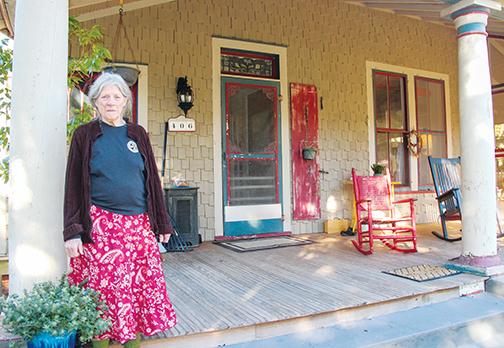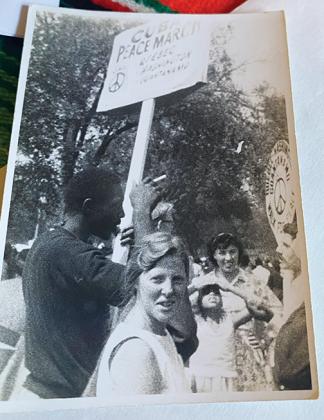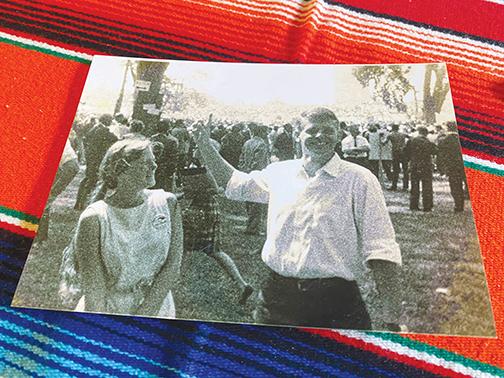Elsbeth Smith remembers fanning herself on a hot June night in 1964 as she sat in a St. Augustine church with police officers guarding the doors and cars blowing loudly past the Washington Street building.
Smith, at the time in her early 20s, waited in the packed St. Mary’s Missionary Baptist Church as news crews and Civil Rights activists waited for Martin Luther King Jr. to arrive at the church.
“(Activist and Baptist Rev. Ralph Abernathy) said, ‘Who’s our leader?’” Smith, who is now 81, recalled Monday. “Everybody said, ‘Dr. Martin Luther King.’ And then, all of a sudden Dr. King came in, and he spoke at the church.”
She described King as a gentle, loving man who knew where he was going in his life.
Smith said she, her former husband, her brother-in-law and news crews were the only white people in the church that night. Before King came to speak, Black people told their stories at the pulpit of the injustices they suffered earlier that day, Smith said.
“Every time I drive by, I remember the testimonies given that night, the singing and the triumphant moment when Dr. King slipped up to the podium to speak,” Smith wrote in an excerpt from her life writings. “I rejoice that we were three white people that had the courage to be there. We had no fears.”
Smith said it was an “agitated night,” but she saw no incidents of violence - unlike other days St. Augustine experienced that year.
That same month, on June 11, 1964, King and The Rev. Abernathy were two protesters in a group of eight people, both Black and white, arrested in the city for refusing to leave a segregated restaurant after being refused service, an article from the United Press International states.
That day, according to the article, marked the 14th time King had been arrested. The restaurant owner, James Brock, also owned the Monson Motor Lodge in St. Augustine, where, just a week after refusing to serve Black customers, protesters jumped into the lodge’s “whites only” pool, according to documents from the Civil Rights Library of St. Augustine.
Photo records from June 18, 1964, show Brock pouring acid into the pool to get the demonstrators to leave. The hotel has since been demolished, and in its place sits a Hilton Hotel in downtown St. Augustine.
Smith said the whole reason she and her husband drove to St. Augustine from the home in Merritt Island was that her brother-in-law, a student in law school at the time, represented the American Civil Liberties Union. The organization sent him to St. Augustine to offer legal advice to people who needed help, and Smith said she and her husband decided to join him.
Smith said they drove down for one night after many of the violent incidents occurred but policemen still patrolled the outside of the church and tensions were high.
“I was a little bit concerned you know that something could happen,” she said about being in St. Augustine during that time. “I mean, it was sort of unusual – people shooting guns in a little neighborhood like that.”
She did get one more meeting with King, though.
The morning after he spoke at St. Mary’s, Smith said activists scheduled a press conference at the church, but only four people showed up and no news outlets. It was just her, her husband at the time, her brother-in-law and King, himself.
“I sat right next to him,” the Palatka resident recalled. “We talked about what he was going to do next, you know, what his goals in life were. We talked about where he grew up, and we talked about his father.”
King also gave her a signed photo of himself, which Smith said she donated to the school where she taught during that time. She taught music at an all-Black, segregated school in Merritt Island and gave it to the school as an end-of-the-year gift.
Although she did not walk with King, the 81-year-old said she marched in the 1960s Quebec-Washington-Guantanamo Walk for Peace when protesters came through the Central Florida area.
“I used to get a lot of feedback for that because cars would – when we would get into the (cities) – cars would stop and scream at you. And they would always say to me, ‘You need to go home to your mother’ despite the fact that I was pretty grown,” Smith said, laughing a little as she thought back to that time.
Smith said she decided to march in the 1960s because she wanted to take a stand against injustices and let people know some people will fight for change. At 81, Smith still remembers seeing signs distinguishing water fountains for white people from those only for Black people.
“Things like that you never really forget, you know?”
Palatka resident Ruth Benjamin, 74, also remembers the segregated water fountains and not being able to drink from one because she is Black.
“(King) brought down those barriers, and it was very real,” said Benjamin, who was also the chairwoman for Monday’s Martin Luther King Jr. festival.
She said celebrating the activist is not only about honoring him, but about showing young people the opportunities they have now that not every Black citizen had in America at one time. King was the champion of opening doors for the Black community, and now she, and every other Black person, can enjoy hotels and restaurants.
“We owe him a debt of gratitude for his sacrifice,” Benjamin said. “Those who lived through it can appreciate Dr. King for opening doors.”
Smith, too, said it is important people keep celebrating King’s efforts to bring about equal rights for all people.
“He took such a beautiful stand against what was happening,” Smith said. “He’s a great speaker. He was just the man made for the job. … I think he hoped for change and that people would move on to better times.”
Copyright 2022 by Palatka Daily News - all rights reserved.




